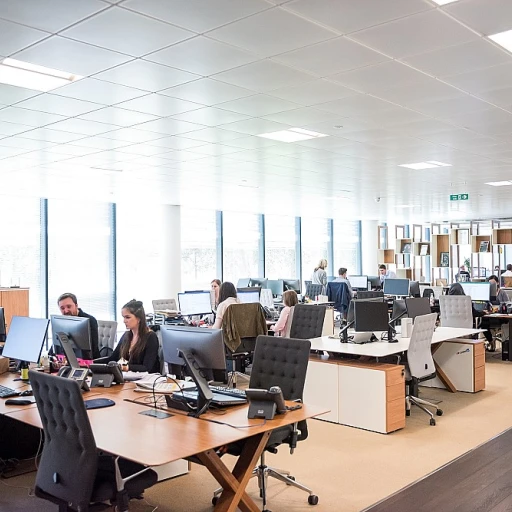
The Millennial Workforce: Who Are They?
Analyzing the Millennial Workforce
Understanding why millennials are leaving their jobs at an unprecedented rate begins with a closer look at the millennial workforce itself. Recognized as individuals born between 1981 and 1996, this generation has grown up alongside the rapid advancement of technology and shifting societal norms. Millennials are often portrayed as adaptable, tech-savvy, and highly educated, traits that have undoubtedly shaped their expectations in the workplace.
The millennial generation reflects a dynamic change in values compared to previous generations. While baby boomers might have prioritized job stability and company loyalty, millennials seek flexibility, purpose, and life balance. This change in priorities has contributed to the concept of "quiet quitting," where workers fulfill their job duties without extra effort, often due to lack of engagement or fulfillment.
Contrary to some stereotypes, millennials are driven by more than just personal advancement or a paycheck. They frequently seek opportunities that offer both personal and professional growth, valuing a workplace culture that aligns with their own values. This desire for meaningful work can sometimes lead to millennials quitting jobs that don't meet their expectations, causing employers to question how to better attract and retain this generation of workers.
Moreover, the necessity of creating opportunities for career growth has become critical. Millennials are not afraid to leave job roles for organizations that prioritize succession planning and development, often seeking jobs that allow them to develop new skills and progress within a company.
Ultimately, to fill the gap left by millennial workers, employers need to adapt to these changes and recognize when an employee might be ready to leave. Building a supportive and engaging work environment can help mitigate the incline in millennial departures, ensuring a productive and loyal workforce.”}
Why Millennials Are Leaving: Key Factors
Why Millennials Choose to Walk Away
In the era of rapid change, the millennial generation has distinct reasons for leaving jobs, a trend often referred to as "millennials quitting." Understanding these departures involves examining both the pressures and preferences that millennials face in the workplace culture.
One significant factor is the quest for work-life balance. Unlike previous generations, millennials prioritize a harmonious integration of their professional and personal lives. This generation also values meaningful work over a simple paycheck. When their roles fail to align with their personal values or offer a sense of purpose, they tend to seek environments that will.
- Stagnation at Work: Lack of career development opportunities can lead to quiet quitting. Millennials need to see a path of succession planning for their careers—a clear job trajectory that promises growth and new challenges.
- Rigid Work Structures: While previous generations might have conformed to the 9-to-5 grind, the millennial workforce demands flexible work arrangements that accommodate their lifestyles.
- Digital Work Environment: Growing up in the digital age, millennials see the integration of social media and technology as essential within the workplace. They are inclined to leave environments that do not embrace innovative tools and platforms.
- Poor Leadership and Engagement: The absence of engaged, empathetic leadership can lead to dissatisfaction. Millennials seek leaders who foster a culture of engagement and transparency.
By understanding and addressing these concerns, employers can better attract and retain this valuable segment of the workforce, rather than facing the frustration of seeing promising millennial workers walk away after mere weeks or hours ago.
The Role of Leadership in Retention
The Importance of Leadership in Retaining Millennials
Engaging millennial workers requires a shift in leadership approach compared to previous generations. Millennial employees seek more than just a paycheck; they desire a workplace culture that aligns with their values and a leadership style that fosters growth, not dictatorship.
Millennials value transparency and communication from their leaders. Unlike baby boomers, this generation thrives on feedback and is accustomed to the immediacy of social media and digital communication. A leader who communicates openly helps to create an environment of trust and reduces instances of quiet quitting, where employees are disengaged but continue to show up at work.
Here are some strategies leaders can adopt to better connect with their millennial workforce:
- Offer regular feedback: Millennials appreciate frequent feedback, not just during annual reviews. Quick check-ins and constructive evaluations can make them feel valued and understood.
- Promote a collaborative atmosphere: Providing opportunities for team-based projects and open dialogue can enhance work relationships and help retain top talent.
- Facilitate career development: By understanding millennials' desire for growth opportunities, leaders can implement effective succession planning to fill roles internally as the company expands.
- Foster work-life balance: Understanding the need for flexibility, leaders must accommodate the lifestyle millennials wish to lead, incorporating remote work options and acceptable work-life balance schemes.
Effective leadership is pivotal in bridging the gap and retaining millennial employees. Highlighting and addressing the unique needs of this generation will influence their decision to stay longer in the organization, contributing to its overall success and continuity.
Creating a Culture of Engagement
Fostering a Positive Workplace Culture
Creating a culture of engagement is crucial in retaining millennial workers. This generation values a workplace culture that aligns with their personal values and provides a sense of belonging. Unlike previous generations, millennials prioritize work-life balance and seek environments where they feel their contributions are valued.
To attract and retain this generation, employers need to focus on building a positive workplace culture. This involves promoting open communication, encouraging collaboration, and recognizing achievements. Millennials are more likely to stay with a company where they feel their voices are heard and their efforts are appreciated.
Encouraging Social Connections
Social media has influenced how millennials interact and form connections. In the workplace, fostering social connections can enhance engagement and reduce the likelihood of quiet quitting. Employers can organize team-building activities or create spaces where employees can interact informally. These efforts help fill the need for social interaction and can make the workplace more enjoyable.
Aligning Values and Mission
Millennials are drawn to companies whose values align with their own. They want to work for organizations that are socially responsible and contribute positively to society. Employers should clearly communicate their mission and values, ensuring they resonate with the millennial workforce. This alignment can be a significant factor in reducing turnover and increasing job satisfaction.
In conclusion, creating a culture of engagement requires intentional efforts from employers. By fostering a positive workplace culture, encouraging social connections, and aligning company values with those of the millennial generation, businesses can significantly improve employee retention.
Flexible Work Arrangements: A Necessity
Flexible Work Approaches for a Dynamic Workforce
In today's workplace, it's no surprise that flexible work arrangements have become more than just a perk; they're a necessity. Millennial workers, part of a generation that values work-life balance above many other job benefits, are continuously seeking flexibility in their roles. This need stems from several reasons peculiar to the millennial generation, which set them apart from baby boomers and previous generations. The concept of '9 to 5' is quickly becoming outdated. Millennials, who often juggle work, life, and personal development, expect jobs that offer adaptable schedules. This approach allows them to mold their work around their life, rather than the other way around. Employers who embrace flexible work arrangements often find themselves at an advantage when it comes to attracting and retaining top talent. Flexible schedules aren't just about remote work or allowing employees to work from home; they include various options like compressed workweeks, job sharing, and even roles that let employees choose their hours. By giving millennial employees the power to dictate their own hours, businesses not only boost job satisfaction but also enhance productivity. This adaptation dovetails with other critical areas for retaining millennial workers, such as fostering a workplace culture of engagement and providing career development opportunities. Employers can cultivate an environment where millennials feel valued and understood by demonstrating a commitment to their work-life balance needs. In conclusion, businesses willing to modify traditional work structures and genuinely implement flexible work policies will likely see a significant increase in both recruitment competitiveness and retention rates. By doing so, they not only meet the expectations of the millennial workforce but also future-proof their operations for generations to come.Career Development and Growth Opportunities
Fostering Professional Growth Opportunities
Providing millennials with career development and growth opportunities plays a crucial role in employee retention. As a generation seeking fulfillment in their work roles, millennial workers value environments where they can continue to learn and advance their careers. Many millennials are characterized by their desire for constant progression. This is starkly different from previous generations, where workers often valued stability over change. Baby boomers, for instance, might have stayed with one employer for decades without seeking significant professional changes. To cater to the millennial generation's penchant for growth, employers should:- Implement Well-Defined Career Paths: Offering clear career advancement opportunities helps motivate and engage employees. This can include promotions, lateral moves, or role changes that align with the employee's goals.
- Invest in Continual Learning: Providing access to professional development workshops, online courses, or tuition assistance programs can inspire millennials to stick around. Employees benefit from a more skilled workforce, and millennials find satisfaction in expanding their knowledge base.
- Establish Mentorship Programs: Pairing millennials with seasoned industry veterans can offer them the guidance and support they need to navigate their careers successfully. This exchange of experiences not only aids in succession planning but also strengthens workplace culture.
- Recognize and Reward Contributions: Millennials appreciate environments that recognize their contributions, not only monetarily. Recognition through public acknowledgment, added responsibilities, or even more autonomy in their roles can significantly improve retention rates.













